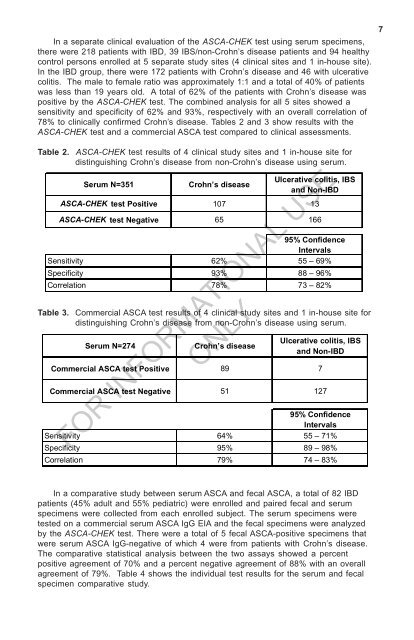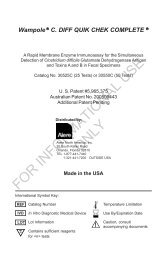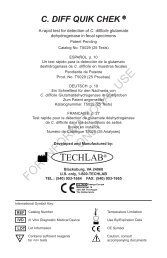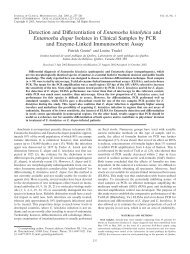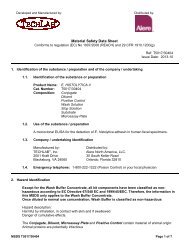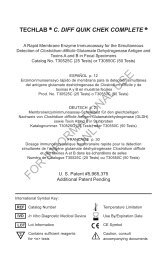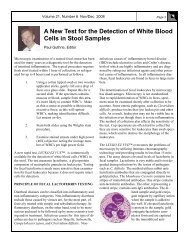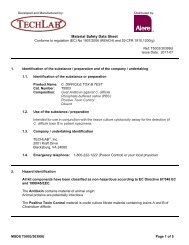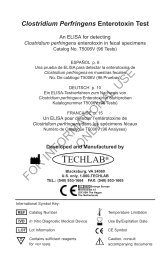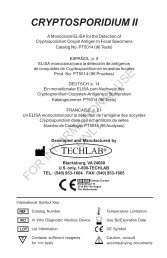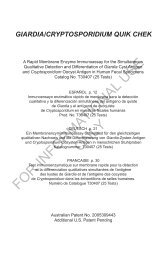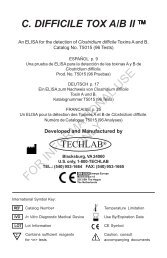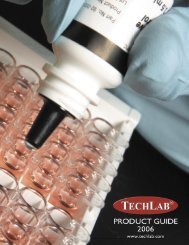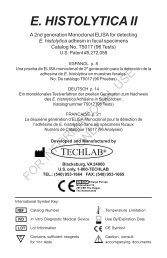ASCA-CHEK - TechLab
ASCA-CHEK - TechLab
ASCA-CHEK - TechLab
You also want an ePaper? Increase the reach of your titles
YUMPU automatically turns print PDFs into web optimized ePapers that Google loves.
In a separate clinical evaluation of the <strong>ASCA</strong>-<strong>CHEK</strong> test using serum specimens,<br />
there were 218 patients with IBD, 39 IBS/non-Crohn’s disease patients and 94 healthy<br />
control persons enrolled at 5 separate study sites (4 clinical sites and 1 in-house site).<br />
In the IBD group, there were 172 patients with Crohn’s disease and 46 with ulcerative<br />
colitis. The male to female ratio was approximately 1:1 and a total of 40% of patients<br />
was less than 19 years old. A total of 62% of the patients with Crohn’s disease was<br />
positive by the <strong>ASCA</strong>-<strong>CHEK</strong> test. The combined analysis for all 5 sites showed a<br />
sensitivity and specificity of 62% and 93%, respectively with an overall correlation of<br />
78% to clinically confirmed Crohn’s disease. Tables 2 and 3 show results with the<br />
<strong>ASCA</strong>-<strong>CHEK</strong> test and a commercial <strong>ASCA</strong> test compared to clinical assessments.<br />
Table 2. <strong>ASCA</strong>-<strong>CHEK</strong> test results of 4 clinical study sites and 1 in-house site for<br />
distinguishing Crohn’s disease from non-Crohn’s disease using serum.<br />
Serum N=351<br />
Crohn’s disease<br />
Ulcerative colitis, IBS<br />
and Non-IBD<br />
<strong>ASCA</strong>-<strong>CHEK</strong> test Positive 107 13<br />
<strong>ASCA</strong>-<strong>CHEK</strong> test Negative 65 166<br />
95% Confidence<br />
Intervals<br />
Sensitivity 62% 55 – 69%<br />
Specificity 93% 88 – 96%<br />
Correlation 78% 73 – 82%<br />
Table 3. Commercial <strong>ASCA</strong> test results of 4 clinical study sites and 1 in-house site for<br />
distinguishing Crohn’s disease from non-Crohn’s disease using serum.<br />
Serum N=274<br />
Crohn’s disease<br />
Ulcerative colitis, IBS<br />
and Non-IBD<br />
Commercial <strong>ASCA</strong> test Positive 89 7<br />
Commercial <strong>ASCA</strong> test Negative 51 127<br />
95% Confidence<br />
Intervals<br />
Sensitivity 64% 55 – 71%<br />
FOR INFORMATIONAL USE<br />
ONLY<br />
Specificity 95% 89 – 98%<br />
Correlation 79% 74 – 83%<br />
7<br />
In a comparative study between serum <strong>ASCA</strong> and fecal <strong>ASCA</strong>, a total of 82 IBD<br />
patients (45% adult and 55% pediatric) were enrolled and paired fecal and serum<br />
specimens were collected from each enrolled subject. The serum specimens were<br />
tested on a commercial serum <strong>ASCA</strong> IgG EIA and the fecal specimens were analyzed<br />
by the <strong>ASCA</strong>-<strong>CHEK</strong> test. There were a total of 5 fecal <strong>ASCA</strong>-positive specimens that<br />
were serum <strong>ASCA</strong> IgG-negative of which 4 were from patients with Crohn’s disease.<br />
The comparative statistical analysis between the two assays showed a percent<br />
positive agreement of 70% and a percent negative agreement of 88% with an overall<br />
agreement of 79%. Table 4 shows the individual test results for the serum and fecal<br />
specimen comparative study.


